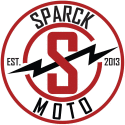So I'm registered for a quick 6 hour intro to MIG welding class at a local college. Haven't touched a welder before.
There's also someone local offering beginner lessons in TIG, but the 'classes' are in his unheated garage and are the same price or more than the class at the college. TIG equipment is a lot more expensive than MIG, and I figure I have a better chance at actually getting something done in MIG as a beginner.
So anyhow - looking to invest some money in a MIG setup. I have 220v in the garage, on a 30A circuit.
Any suggestions on how big of a MIG welder to buy? I've been looking at things like the Lincoln Mig Pak 180, which goes on sale here from time to time for around $450.
I don't want to buy something that I'll be frustrated with a year from now and want to replace. Would rather just get something that is capable of welding on all the brackets I want onto motorcycle frames and adding some bracing to my little utility trailer.
Thoughts?
There's also someone local offering beginner lessons in TIG, but the 'classes' are in his unheated garage and are the same price or more than the class at the college. TIG equipment is a lot more expensive than MIG, and I figure I have a better chance at actually getting something done in MIG as a beginner.
So anyhow - looking to invest some money in a MIG setup. I have 220v in the garage, on a 30A circuit.
Any suggestions on how big of a MIG welder to buy? I've been looking at things like the Lincoln Mig Pak 180, which goes on sale here from time to time for around $450.
I don't want to buy something that I'll be frustrated with a year from now and want to replace. Would rather just get something that is capable of welding on all the brackets I want onto motorcycle frames and adding some bracing to my little utility trailer.
Thoughts?






